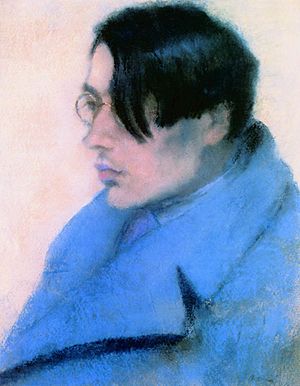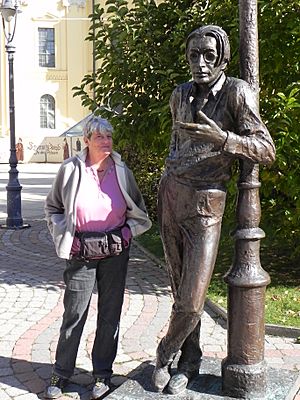Lőrinc Szabó facts for kids
Lőrinc Szabó de Gáborján was a famous Hungarian poet and translator. He was born in Miskolc on March 31, 1900, and passed away in Budapest on October 3, 1957.
Contents
About Lőrinc Szabó
Lőrinc Szabó was born in Miskolc. His father, also named Lőrinc Szabó, was an engine driver, and his mother was Ilona Panyiczky. When he was three years old, his family moved to Balassagyarmat.
He went to school in Balassagyarmat and Debrecen. Later, he studied at the ELTE university in Budapest. There, he became good friends with another important writer, Mihály Babits.
Lőrinc Szabó did not finish his university studies. Instead, he started working for a literary magazine called Az Est in 1921. Around the same time, he married Klára Mikes. He worked at the magazine until 1944. From 1927 to 1928, he also helped start and edit another magazine called Pandora.
His First Poems and Awards
Lőrinc Szabó's first poems were published in the 1920s in a well-known literary magazine called Nyugat, which means "The West." His first book of poems, titled Föld, erdő, Isten (meaning "Earth, Forest, God"), came out in 1922. It was very popular and successful.
He received the Baumgarten Award three times: in 1932, 1937, and 1943. This award was a big honor for writers and poets in Hungary.
His Work as a Translator
Besides writing his own poems, Lőrinc Szabó was also a talented translator. He translated many famous works from other languages into Hungarian.
He translated several plays by William Shakespeare, including Timon of Athens, As You Like It, Macbeth, and Troilus and Cressida. He also translated poems like Coleridge's Ancient Mariner and Kubla Khan.
He worked with other poets to translate Baudelaire's Les Fleurs du mal. His other translations include François Villon's Grand Testament, Molière's The School for Wives, and Goethe's The Sorrows of Young Werther. He also translated works by many other important writers from different countries.
Challenges and Recognition
During World War II, Lőrinc Szabó joined a group called the "European Writers' League." This group was started by a German official named Joseph Goebbels. Because of his involvement with this group, after the war, he faced difficulties. He was not allowed to publish his own poems for a while, and could only publish his translations.
However, his importance as a poet was recognized again shortly before he passed away. He received the Kossuth Prize, which is one of the highest awards in Hungary. Lőrinc Szabó died from a heart attack in 1957.
His Poetry
Many of Lőrinc Szabó's poems were written for his own children, named Lóci and Klári. In other poems, he often wrote about his own childhood memories.
One of his famous works is a collection of sonnets called The 26th Year. This book was published in 1957.
Books of Poetry
Here are some of the poetry books Lőrinc Szabó published:
- Föld, erdő, Isten (Earth, Forest, God, 1922)
- Kalibán (Caliban, 1923)
- Fény, fény, fény (Light, Light, Light, 1926)
- A Sátán műremekei (Masterpieces of Satan, 1926)
- Te meg a világ (You and the World, 1932)
- Különbéke (Separate Peace, 1936)
- Harc az ünnepért (Fight for the Holiday, 1938)
- Régen és most (Then and Now, 1943)
- Tücsökzene (Cricket Song, 1947)
- A huszonhatodik év (The 26th Year, 1957)
See also
 In Spanish: Lőrinc Szabó para niños
In Spanish: Lőrinc Szabó para niños
 | Ernest Everett Just |
 | Mary Jackson |
 | Emmett Chappelle |
 | Marie Maynard Daly |



